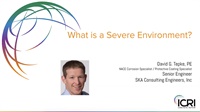What is a 'Severe Environment'?
Total Credits: 0.5 PDH
- Categories:
- Technical Presentations
- Presenter:
- David G. Tepke, PE, FACI
- Duration:
- 42 Minutes
- Format:
- Audio and Video
- License:
- Access for 6 month(s) after purchase.
Description
Repairing and extending the service life of concrete in severe environments first requires that one understands what may be considered severe why it may be considered so. This presentation will discuss the ways in which different organizations and technical committees around the world define ‘severe environments’ for concrete structures; types of deterioration mechanisms and materials-related distress that may severely and quickly deteriorate concrete, type of structures with potentially severe environments, and U.S. geographical considerations. Although the focus of the presentation will be on the definition of ‘severe’ and the types of issues that make a particular condition severe, the presentation will also discuss repair strategies that may be used to for addressing the described issues. Distress mechanisms such as corrosion, sulfate attack, ASR, freezing and thawing distress and fire will be discussed, as they pertain to manufacturing and processing, infrastructure (water, energy, transportation), parking, transportation, coastal and other structures. The primary goal is that the audience will be able to use the presentation for a basis of understanding of ‘severe’ in development of repair strategies for these structures.
Learning Objectives:
- Identify general types of deterioration mechanisms in concrete that may hasten deterioration of concrete structures, leading to a ‘severe environment.'
- Determine if a structure is susceptible to being in a ‘severe environment’ based on type and geographical location in the United States.
- Describe the ways in which originations around the world define ‘severe environment’ for concrete structures.
- Summarize repair strategies for addressing deterioration in ‘severe environments’.
Presenter

David G. Tepke, PE, FACI Related Seminars and Products
Principal Engineer
SKA Consulting Engineers, Inc.
David G. Tepke, PE, FACI, is a Principal Engineer and Group Manager at SKA Consulting Engineers, Inc., Charleston, SC, office. His primary interests and experience include testing and analysis, construction evaluation and troubleshooting, structural investigations, durability assessments and design for service life-extension of new and existing structures.
David serves on ICRI Committees 160 (Life-Cycle and Sustainability), 510 (Corrosion); and ACI Committees 201 (Durability), 301 (Specifications), 222 (Corrosion), and 329 (Performance Criteria for Ready-Mix Concrete). He is a Fellow of the American Concrete Institute, and a NACE/AMPP Certified Corrosion Specialist and Protective Coating Specialist. He is also an At Large member of the ICRI Board of Directors.
David received his B.S. and M.S. in Civil Engineering from Penn State University and is a registered professional engineer in a number of states.
